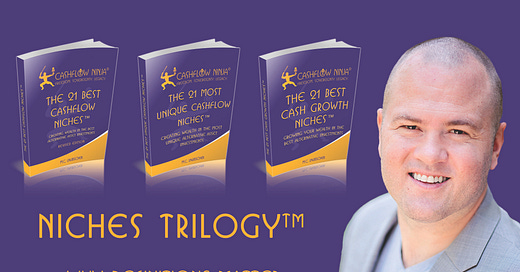I’m blessed to have a platform called Cashflow Ninja®, where I’ve interviewed brilliant minds in business, investing, economics, and finance. In these conversations, my guests have shared the wealth-building strategies of the 0.01%.
So, what is one of the most significant differences between mainstream conventional wealth-building strategies, followed by 99.99% of the global population, and the contrarian wealth-building strategies, followed by 0.01% of the global population?
The 0.01% know the superpower of understanding definitions.
Why is that a superpower and especially a superpower in wealth building?
99.99% of the global population does not understand the difference between saving, investing, speculating, and gambling.
99.99% of the global population repeats statements like, “I save for retirement in the stock market.”
The 0.01% understand definitions and why they matter. They know that definitions are not fluid. It cannot be changed to suit an agenda from a country’s central bank or government.
Let’s look at the definitions of saving, investing, speculating, and gambling.
Saving involves setting aside a portion of your income for future use. This is typically done by placing money in low-risk, savings vehicles. The main goal of saving is to preserve your capital and maintain liquidity. Saving is often used for short-term goals or as an emergency fund.
Investing is the practice of purchasing assets with the expectation that they will generate income or appreciation over time. Investments, including stocks, bonds, real estate, and mutual funds, are typically made for the medium to long term. Unlike saving, investing carries more risk and offers the potential for higher returns. Investors aim to build wealth over an extended period and often conduct research and due diligence to make informed decisions. Investment returns can come from capital gains, dividends, or interest.
Speculating involves allocating capital with the expectation of high returns resulting from price movements, often within a short time frame. Speculation carries a higher level of risk compared to saving and investing. It is based on market timing and price predictions rather than fundamental analysis. Speculators may use sophisticated strategies like derivatives and leverage. While there is potential for significant gains, there is also a considerable risk of losses.
Gambling refers to wagering money on uncertain outcomes to win additional money. It is characterized by a lack of control over the outcome and relies heavily on chance or luck. Gambling is associated with very high risk, and the odds are often skewed in favor of the house or bookmaker. Unlike saving, investing, or speculating, gambling does not contribute to economic productivity, and there is no expectation of earning a long-term return.
Do you now see that people who think they are ‘saving for retirement in stocks” do not understand basic financial definitions?
Most people who follow mainstream conventional wealth-building strategies have yet to learn what they are doing.
The 0.01% know these definitions and precisely what they do when managing their capital.
How about the definitions of wealth and financial freedom?
It seems essential to define wealth clearly if you wish to build it and financial freedom if you wish to achieve it.
When I think of wealth holistically, I think of things that are valuable to me and things I wish to have more of.
By having more of these valuable things, I will become wealthier.
I describe these things that I find valuable as capital.
Capital comes in many different forms.
Here are ten forms of capital:
1. Spiritual capital (your connection to the creator)
2. Human capital (your physical and mental health, skill sets and capabilities)
3. Intellectual capital (your knowledge and wisdom)
4. Relationship capital (your family, friends, network)
5. Social capital (trust you have with your family, friends, and network)
6. Cultural capital (shared values and principles, worldview, beliefs, and system within your tribe)
7. Political capital (influence you have in your family, friends circle, network)
8. Natural & biological capital (water, food, livestock, commodities)
9. Build capital (physical things created that are valuable)
10. Financial capital (paper assets, real estate, businesses, commodities)
When thinking of wealth and capital, most people automatically only think of financial capital and wealth.
The irony is that you will grow your financial capital by focusing on the first nine types of capital.
My definition of wealth is to have age-defying health, soulful and fulfilling relationships, daily dedication to my purpose and legacy, and infinite cashflow income streams from my businesses and investments.
This article is a free chapter from one of the Niches Trilogy books by M.C. Laubscher.
Download all the Niches Trilogy Books:
The 21 Best Cashflow Niches
https://www.cashflowninjaprograms.com/the-21-best-cashflow-niches-book
The 21 Most Unique Cashflow Niches
https://www.cashflowninjaprograms.com/the-21-most-unique-cashflow-niches
The 21 Best Cash Growth Niches
https://www.cashflowninjaprograms.com/the-21-best-cash-growth-niches




